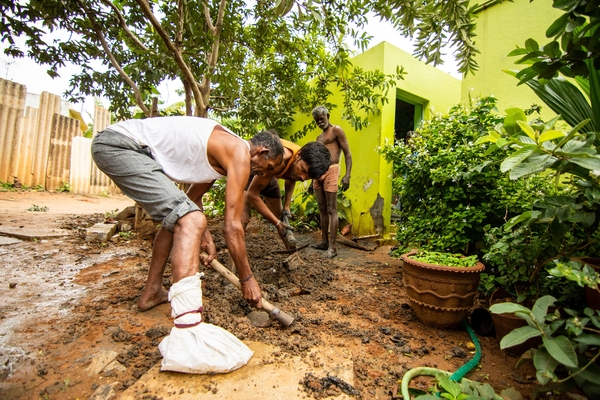How Can We Support Sanitation Workers During COVID-19?

NEW DELHI, Apr 10 (IPS) - In addition to healthcare professionals, there is another group of people at the frontlines of the global crisis caused by COVID-19. They put their lives at risk every day and play a critical role in preventing the spread of the virus, by ensuring our streets, parks, public spaces, sewers, septic tanks, communities, and public toilets are kept clean and hygienic.
They are our often-overlooked sanitation workers. These five million public health and safety workers—who continue to work through the COVID-19 pandemic—are unprotected, stigmatised, unappreciated, and seen as people to be shunned.
One of the biggest challenges they face is that they have no information about affected households, nor about those who are at high risk. If they contract the virus, they have very little recourse to health safety nets, insurance, or access to already overflowing public health facilities.
This is particularly stark for women sanitation workers, who make up more than 50 percent of urban sanitation workers.
What needs to be done to ensure the health and safety of these essential workers?
Provide protective equipment
While we recognise that frontline staff in hospitals and health facilities face a dire shortage of personal protective equipment (PPE), the need of the hour is also to find ways to provide sanitation workers with the following necessities: masks (at the very least, double-layered stitched cloth masks), rubber gloves, aprons, protective footwear or boots, sanitiser, and soap.
In Maharashtra, the government has allowed all Urban Local Bodies to use the Fourteenth Finance Commission funds to purchase PPE for sanitation workers, and allowed sanitation workers to work in shifts. In Telangana, self-help groups (SHGs) have been roped in to produce masks for sanitation workers.
Provide financial support
This can be done both at individual and organisational levels.
- Protection of salaries: An advisory has been issued by the Ministry of Housing and Urban Affairs stating that the salaries of sanitation workers must be protected if they are unable to report to duty due to lockdown.
- Allocation of CSR funds to organisations that work with sanitation workers: The Ministry of Corporate Affairs has declared that CSR funds may be utilised for activities related to COVID-19 including preventive healthcare, sanitation, and disaster management.
While such efforts by government at national, state, and city levels are welcome, they do not reach all the five million sanitation workers in India.
Offer support at a local level
Resident Welfare Associations (RWAs) should ensure that sanitation workers who work in their localities have proper PPE. If required, funds can be collected at a local level to ensure that workers have proper safety gear. RWAs can also support the sanitation workers' organisations to ensure that all sanitation workers are provided health insurance and regular health checks. MPs, MLAs, and municipal councilors have annual funds available for development in their respective constituencies and can be encouraged to allocate amounts from these for the welfare of sanitation workers.
Provide access to food and boarding facilities
In Chennai, sanitation workers are provided free meals at Amma Canteens. Local communities could also pool resources to ensure that sanitation workers have access to food and other supplies. This will ensure that they do not have to worry about providing for their families while they are at their jobs.
In terms of helping them self-isolate, to keep their families safe, state governments should explore the option of providing sanitation workers with boarding in designated hostels and residential facilities. The Delhi government has undertaken a similar step, wherein hotel rooms have been rented for doctors who do not want to go home for the fear of infecting their families with COVID-19.
Finally, it is important to raise the profile of sanitation workers—just like we do with all the other health workers—and pay them their due respect, acknowledging their importance as frontline warriors.
Because, just as the nation's health workers tirelessly work to save lives, our sanitation workers have also been working in every ward and mohalla to ensure that we remain safe and healthy. It is time for all of us to recognise this.
The authors are members of the National Faecal Sludge and Septage Management (NFSSM) Alliance.
This story was originally published by India Development Review (IDR)
© Inter Press Service (2020) — All Rights ReservedOriginal source: Inter Press Service
 Global Issues
Global Issues